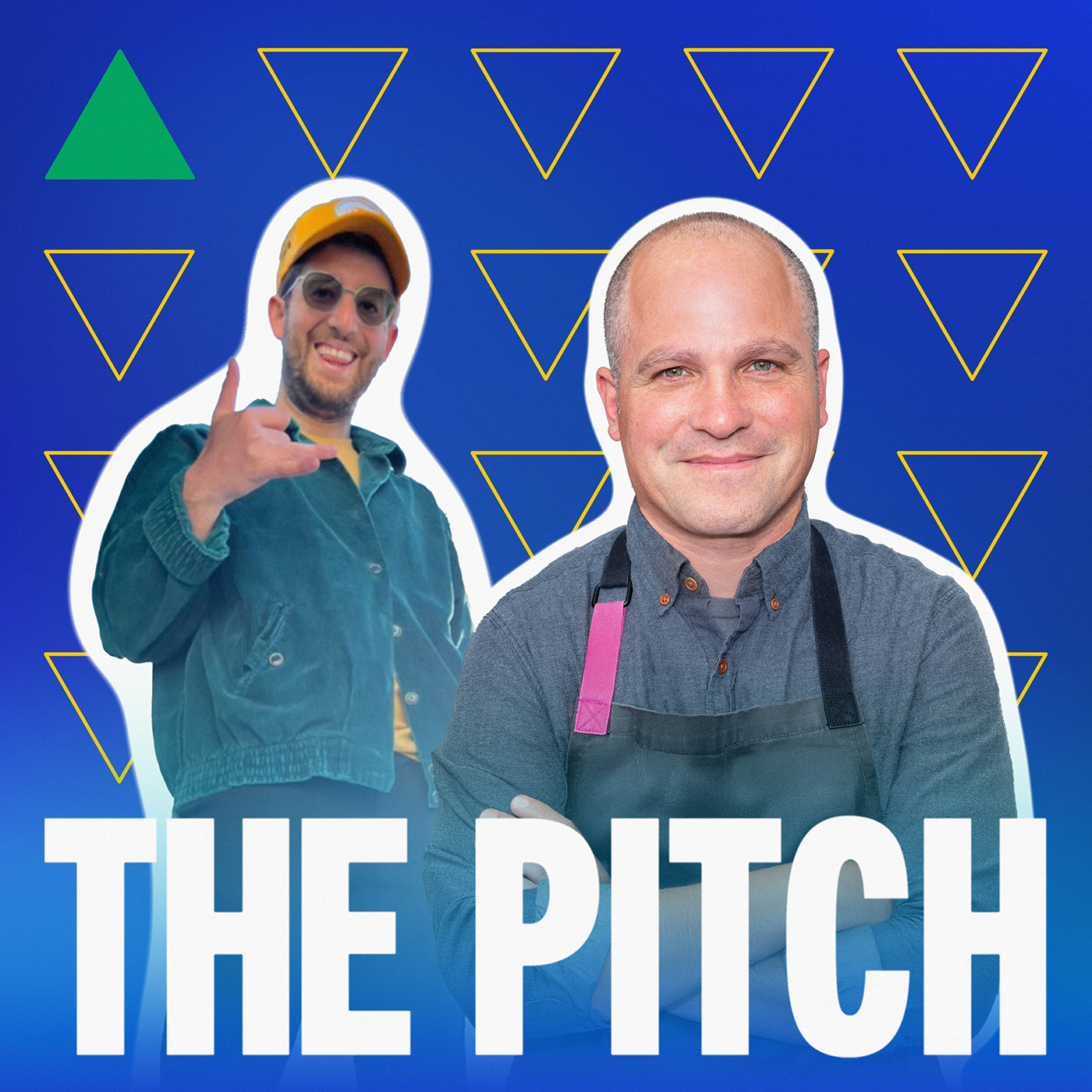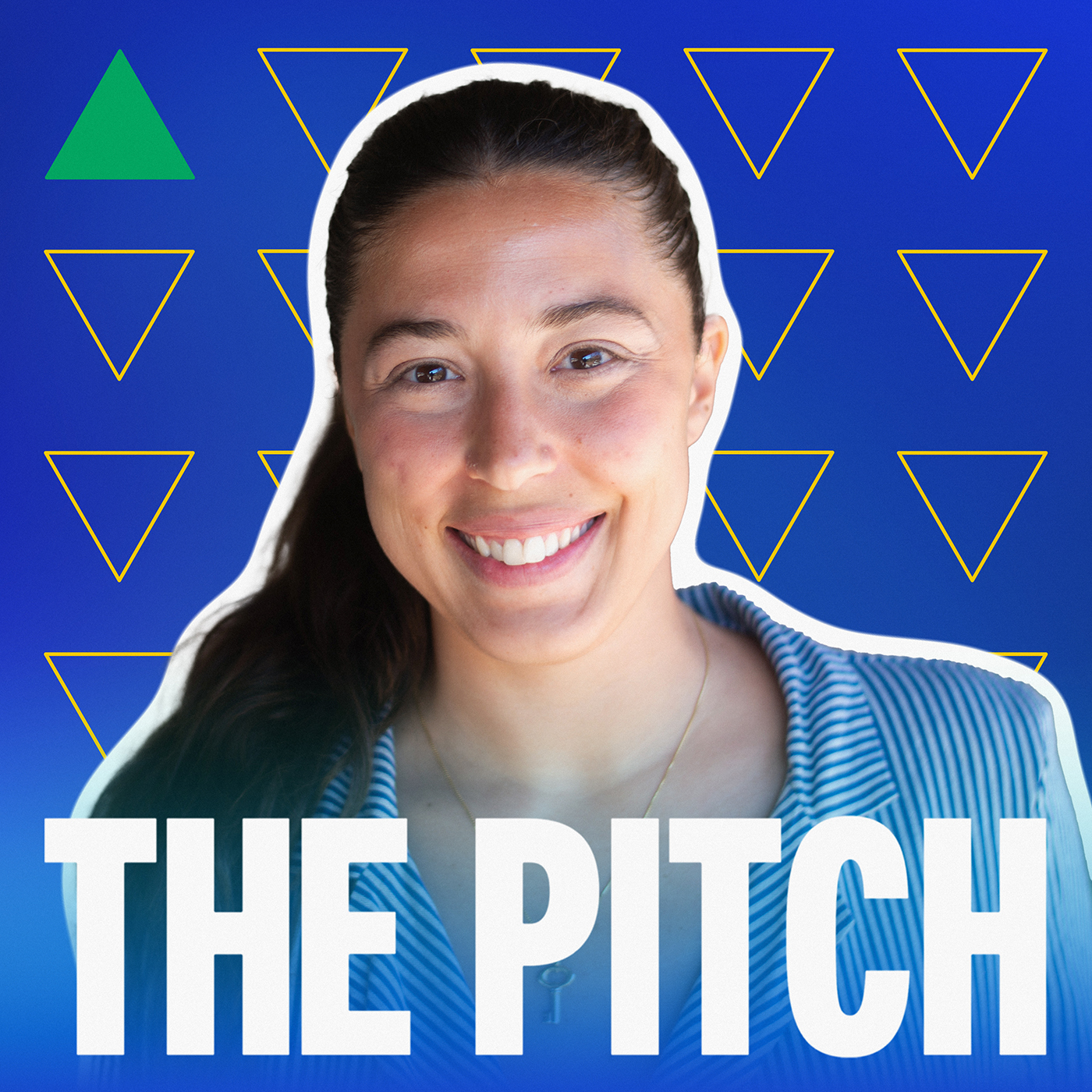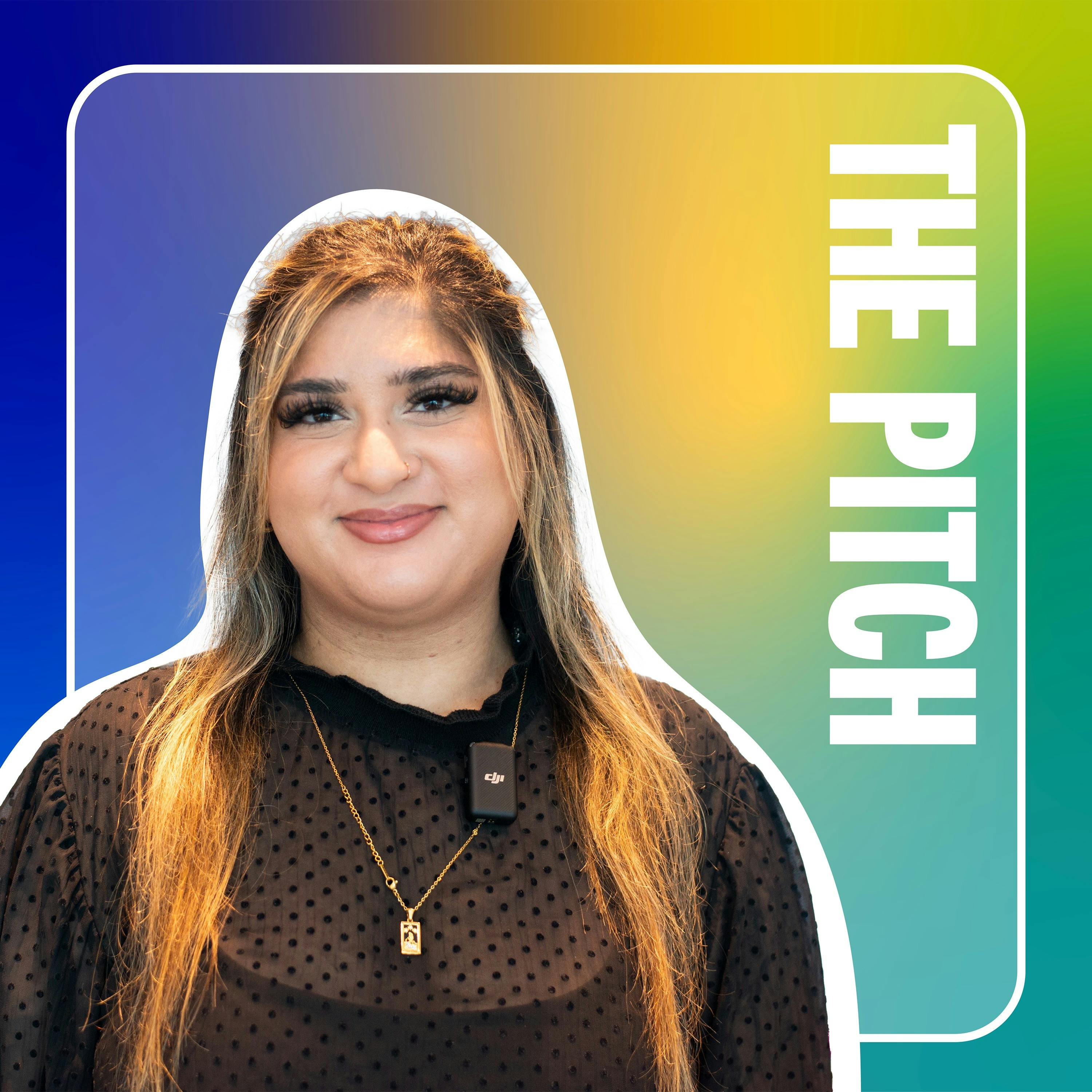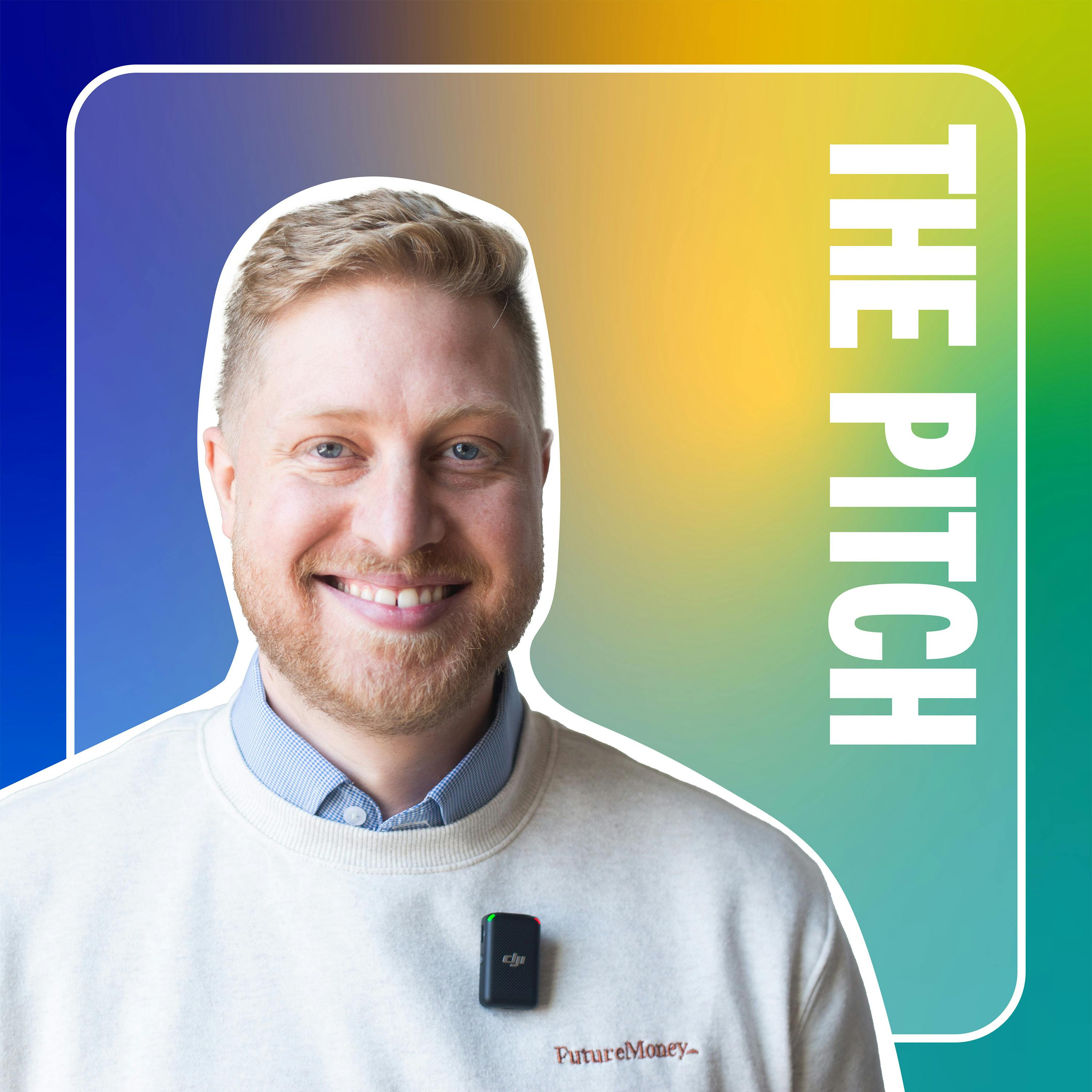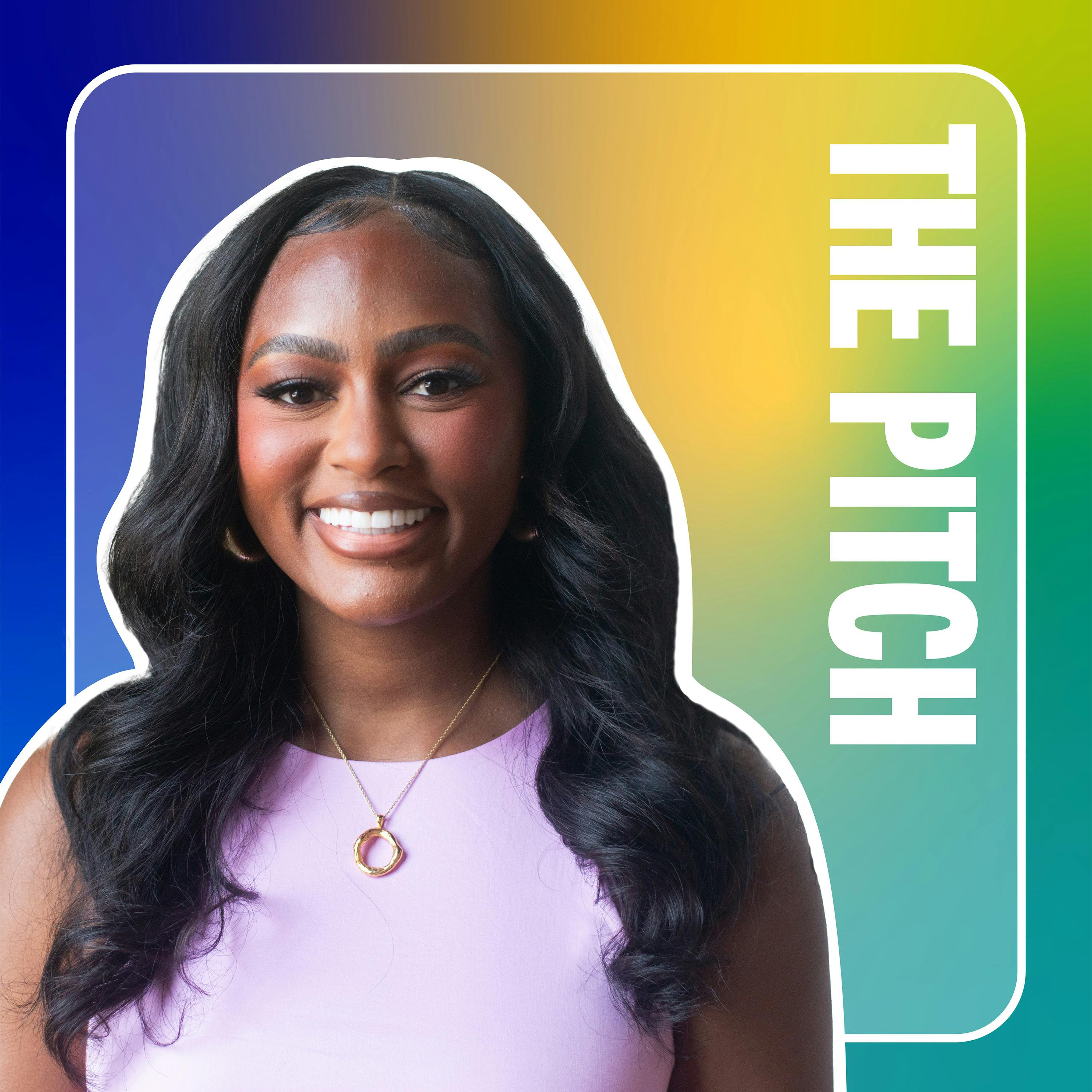#140 geCKo Materials
Biomimicry (noun): the design and production of materials, structures, and systems that are modeled on biological entities and processes.
Founder Capella Kerst invented a material that mimics a geckos' gravity defying grip. This industrial velcro could be a multi-billion dollar industry, and geCKo Materials is shooting for the moon. I mean, they’re already on the International Space Station... how hard can it be?
To invest with us, become an LP in thepitch.fund
*Disclaimer: No offer to invest in geCKo Materials PBC is being made to or solicited from the listening audience on today’s show. The information provided on this show is not intended to be investment advice and should not be relied upon as such. The investors on today’s episode are providing their opinions based on their own assessment of the business presented. Those opinions should not be considered professional investment advice.
Enoying the show? Use this link to text a friend!
I’m Josh Muccio, this is The Pitch, where startup founders raise millions and listeners can invest. The pitch for geCKo Materials is coming up after this.
Historically deeptech startups have not done well on this show, in fact they’ve done so poorly that those episodes rarely see the light of day. If you’re a member of The Pitch Uncut, you know what I’m talking about.
But deeptech, I’m not giving up on you. You are so much cooler than B2B SaaS. For season 12, I vowed to find a deeptech company that would stick.
And when I met Capella Kerst, I thought she was the one to break our deeptech drought.
I’m delighted to say this: today on the show, some actual hard science. Like, a real invention. All based on a lizard.
Charles: Hello
Jesse: Hello.
Capella: How are you.
Charles: I'm good.
Capella: I just washed my hands so they're wet.
Today, Capella is pitching Cyan Banister, Charles Hudson, Mac Conwell, and Jesse Middleton
Jesse: Hey, how are you? Jesse? I don't know if I can make it that far.
Capella: Hello. My name is Capella Kerst. I am the founder and CEO of geCKo Materials, the revolutionary bio-inspired dry adhesive company. This is geCKo Material dry adhesive. And this is a full bottle of wine. As I place geCKo Materials down, I can pick up the bottle of wine with my pinky. It falls off under geCKo Materials' own weight. Traditionally to attach two objects, you need tape, glue or suction. This isn't a tape. This isn't a glue. This isn't a suction, allowing us to be used in vacuum environment It takes milliseconds to engage and disengage, leaving no surface residue or marring left behind. It's rated at 120 kilopascals of sheer strength. That's equivalent to one square inch tile supporting 15 pounds vertically, six one inch tiles pulling a car, or my pinky holding up that full bottle of wine. You can reuse it 120,000 times, being sustainable and energy efficient, helping our customers save energy, time, and money. We have a very focused go-to market strategy, as we are the next industrial Velcro. We're focused on robotics, drones, and space. We're currently on the international space station. Honda, Ford, Toyota, GE, Intel, Hyundai are just to name a few of our some of our customers here on Earth. You can use it in any barometric environment. Also atmospheric nitrogen, hydrogen, vacuum chambers, things like that. We did 727,000 in revenue last year in 2023, and we're on track to doubling it this year. We're currently raising an 8 million round. We are searching for a lead investor, minimum check size 1 million. We have enough follow on from CVCs and other strategics to complete the round. Should I get this in your hands? Pass it around. You could also pick up a cup if you feel more comfortable with a cup.
Capella: Okay, perfect. So this is the feel me. I’ll pass…
Charles: That's really trippy.
Cyan: That's very trippy.
Charles: That's super trippy. Wow.
Capella: And then hold the neck and just rotate it out. See how it releases so quickly.
Charles: That is bullets. It's pretty, pretty amazing.
Charles: The 'feel me' is cool.
Capella: It's not sticky. It's not tacky.
Charles: No, it feels like rubber.
Mac: So this is like the, the things you see in all the info commercials that are supposed to hold your picture frame up and never actually work.
Charles: Except this one actually works.
Jesse: Except this one works.
Cyan: Is it like porous on the surface?
Capella: It's a microstructure with undercut wedges that when pulled [inaudible] they bend over and are pulled.
Cyan: I see.
Capella: Yeah.
Cyan: Like geckos.
Capella: Like geckos, yes. We mimic the gecko's ability to climb up smooth vertical surfaces.
Cyan: That makes sense.
Capella: So this was spun out of my PhD.
Mac: So that was going to be my question. This seems like a tech that came out of a laboratory or a university.
Mac: Where did you get your PhD?
Capella: I did Stanford for my PhD in Mechanical Engineering. and I focused on biomimicry application designs, and I focused on whole life cycle sustainability, mass production and scaling. So quite a mouthful. I'm a very technical founder. I'm very blessed with a small but mighty team that compliment my skill set.
Mac: Amazing. So you did this at school. So is this a tech transfer product? Like, who owns the IP? Do you own it?
Capella: Yeah.
Mac: Are you licensing from the university? What's the situation there?
Capella: Yeah. Great question. So a little background. So biomimicry was started about 20 years ago and it was between a Berkeley and Stanford collaboration, you know, how fun is that? And so I was very blessed to join the Stanford professor that is kind of the godfather of biomimicry. And the research kind of developed from there where we made a man made version while Berkeley looked at the actual gecko. I came in 15 years after that, helped with the development of the fourth generation microstructure. And then I invented a way to mass produce it. And that's what I patented. So I am the sole first inventor on the patent. Stanford is the kind of overseer. And then after I became a company, I licensed it from Stanford for myself. So the geCKo Materials is 1 percent equity, 2.5 percent royalties. It's actually a pretty, pretty good deal for that.
Mac: Got it.
Capella: So then that was my contribution to science, was the mass production techniques. It hadn't been invented before that. It would take over 48 hours to make one unit. Because of the invention and my patent, we can make it in under 15 minutes.
Mac: Amazing. And you've had investors to date, so can you talk us a little bit about how much money you've raised to date? And I would like to know how much money you raised diluted from investors and non-diluted from grants.
Capella: Yes, great question. We did a 2 million pre seed in 2021, with a cap of 26 million. And then we did 775,000 in non-dilutive grants. We've completed two Air Force and Space Force contracts, and we are on the international space station and we're actually in now a standalone, it's not a grant, it's actually a contract in which they're paying, with the Space Force right now. So we've now crossed that grant chasm, and we're now in contract land.
Jesse: That is super impressive. Can you talk a little bit about the supply chain for this and sort of how manufacturing works without - you don't have to share any inside secrets on this podcast. But I'm just curious about sort of what does that look like at scale?
Capella: Yes. Great question. So I developed a mass production method and I focus on whole life cycle sustainability. We want to practice what we preach, helping save energy, time, and money. So everything is sourced locally and made under one roof. So we have a manufacturing facility in the South Bay. And then we make everything in house.
Mac: What are the unit economics on that product?
Capella: In the next two years, we'll be at 88 percent profit margins. So we sell it for $1,000 and it's roughly $200 to make.
Mac: A thousand dollars for how much of it?
Capella: 11 square inches.
Mac: Okay.
Capella: So that's about - you can pull two cars with that. So you can do a lot with just a little.
Cyan: I would like to buy one today.
Capella: Yes, you can.
Cyan: Can I?
Capella: Yep. It's available on our website. You can click through, submit pay by credit card, and we'll ship a product to you and yeah
Cyan: The application I'm thinking of this is for magicians.
Capella: Oh.
The pitch for geCKo Materials will be right back
Cyan: The application I'm thinking of this is for magicians.
Capella: Oh. Yes.
Cyan: Cause I actually think that this would be really incredible for that industry.
Capella: Yeah?
Cyan: And I want to put it in front of a magician and see what they can do with it.
Capella: Okay.
Mac: I was actually thinking about stages.
Cyan: Yeah, stages. And there's just a lot of applications for this outside of -
Capella: Oh, yes, there's - we're the next industrial Velcro. There's so many applications. We'll eventually be at, you know, Home Depot, Safeway. Hey, honey, the kids ran out of, you know, geCKo Materials for a school project, or like we need some more to hang some pictures. Can you run to the store and get some. Like, that's where we're going. We're going to be a multi billion dollar industry.
Jesse: Speaking of, what do you want to get the price point to? If it's going to be in Home Depot, it's not going to be a thousand dollars.
Capella: Yes. Well, actually right now, it is only 10 times more expensive than Command strips, if you're doing area per strength. It's just like the sticker shock of one whole unit. So eventually over time, yes, we do have plans to not cannibalize our high paying customers. We will roll out different backed materials. And then eventually embedding sensors, things like that. So we'll roll out different product lines to lower this initial price point down, still having actually in the 90 percent profit margins as economy to scale.
Cyan: How does it deal with water?
Capella: You can push through the water. So there is applications that we're working with the Navy in that sense, in which you are going to have a gripper that's obviously not on string. Our customers don't make - they make higher fidelity ones than this one, which is why we're raising the 8 million. So you're going to push through the water. If you're making contact, then the wedges can engage. Or you can engage, hold, and submerse in water. And it won't penetrate through the wedges.
Charles: Can you just talk a bit about what the $8 million allows you to do and kind of what the company looks like on the other side of that.
Capella: Yes. Primarily the funds will go towards the application engineering teams, engineering sales and the support staff for that. So we have identified ways to reduce our R&D sales cycle time to commercial recurring revenue. And what that takes is for us in house to make high fidelity models, CAD files, videos, things like that. Demos that we'll send to each of our customers. So say you all own a car company and we're working with you on something. So, you know, we make it a generic high fidelity and then you're going to take the CAD files and tweak it because you have some proprietary design needs. So that is kind of the business model that we're going in. So it's a rinse and repeat. We have a financial projection. So we are 2Xing our revenue this year, 3.8Xing the following year, and then end of five years we'll be ARR of 80 million. And that is based solely upon our current paying customers only and their LOIs that are located in the data room.
Jesse: I am certainly not an expert in any sort of industrial engineering. This seems fascinating to me. We are investors in a number of autonomous vehicle robotics companies. And so while I don't know that I could commit here, I would love the opportunity to share what you're doing with them. They could be customers. And so I don't even know the questions that I should be asking in this, although as a consumer, I think it's like magical. So I I'd love the chance to connect with you after this and try to understand it better from people that could be your customers that could educate us, as well.
Capella: Of course. I would love to do that.
Cyan: So, for me, I love what you're doing, but it's a lot later stage than what I invest in and what my firm invest in. However, a lot of the family offices and LPs that I have in my fund do do this sort of stuff, and I would like to send it to them as an opportunity, if you're okay with that.
Capella: Yes!
Cyan: And then I would love to send it to all of our robotics companies and I see this working from everywhere from the container store, to RVs, to magic tricks, to everything. And so you're really onto something that is universally applicable. Like I'm sitting here dreaming up all kinds of ideas already.
Capella: It's so fun to hear everybody's like ideas.
Cyan: So this is not me not being excited about this. I'm very, very excited. I just wish I got into your pre seed round.
Capella: Thank you. Yeah.
Charles: I think I'm in the same boat as Cyan. It's a bit beyond what we would do at Precursor, but this is super interesting. And I… I have some hardware companies in our portfolio. One in particular that I think could - you could solve some challenges that they've been struggling with.
Capella: Great.
Charles: And like Cyan, I have a few of my investors, too, who are very involved in the world of industrials, who I think have use cases I can't even imagine or articulate. So we'd love to be of help.
Capella: Thank you.
Mac: So when you came in with this amazing product, my initial thought went to tech transfer. So, when I used to work for the state of Maryland, I did a lot of tech transfer with places like University of Maryland, Johns Hopkins. And I would have PhDs and scientists come into our office and show us these amazing, incredible tech that was going to change the world. And I could see how it would change the world, but I also knew it was never going to go anywhere. Because very often they're not business minded. They're not really thinking about commercialization. I was really afraid that you were going to say, we built this amazing thing and we're looking to commercialize it. But then you told me you have contracts already -
Capella: Yes.
Mac: - with government suppliers. That changes everything, because that is a clear playbook. We have seen massive companies build, come out of labs, start in government, and then over time transition. And the technologies that come from government are usually very transformative and usually really big companies. And so this valuation is really high.
Capella: There is no valuation set.
Mac: Well, you're raising a lot. And you started off at two, you raised two on 26. That was your pre-seed. That's, that in itself for a pre-seed is high. So I can only assume where you're going with this one.
We’ll be right back after this.
Mac: So this valuation is really high.
Capella: There is no valuation set.
Mac: Well, you're raising a lot. And you started off at two, you raised two on 26. That was your pre-seed. That's, that in itself for a pre-seed is high. So I can only assume where you're going with this one. But since you already have those government contracts, like, there's a clear playbook for this to be massive in a way that's unreasonable. So I'm really interested. I'm really high on this. And it's companies like you, there's a reason why Silicon Valley exists. That's what made Silicon Valley happen was making technology for the government that then came to consumers and built what we're sitting in right now. So you seem to be in that mold. That's the way I'm thinking about it. So let's chat.
Capella: Thank you. Yes. Would love to chat more.
Cyan: Yeah. I think this could be like a Gore-Tex.
Capella: We're the next multi billion dollar industry.
Cyan: It is. And I definitely, like Mac was thinking the same thing, that this could be a fund returner and I do want to evaluate it as well. By the way, your valuation is fine for what the type of business you are. It's we’re more commenting on the types of businesses we see. And it's not about you. It's just we, we do software mostly.
Capella: Yes.
Cyan: Is really what it comes down to. But you could be a SpaceX-like company At this valuation for a SpaceX, would you get in? Yes? Absolutely, you would. So I don't think it's a no. I just think it's - we wanna get you to the right people cause it's such a great opportunity.
Capella: Great. Thank you. Yeah. And I want the right people too.
Cyan: Yeah.
Cyan: Yeah. Thank you so much.
Jesse: Thank you so much.
Charles: Thank you. So nice to meet you.
Cyan: And I would Venmo you today if I could actually have a strip today.
Capella: I mean, how much are you..
Cyan: You know, like a, a good strip that I can show my magician friends.
Capella: Yeah.
Cyan: I'll buy a thousand dollars today.
Capella: Yeah.
Cyan: Okay.
Capella: Do - credit card is okay?
Cyan: Sure. Well, I didn't bring a credit - I have Apple pay, but I don't think you take Apple pay.
Capella: We might, I’ll ask Dennis.
Jesse: This feels solvable. You Venmo me. I'll pay her.
Cyan: Perfect.
Jesse: Problem solved
Cyan: We'll figure it out.
Mac: There's ways that it can happen.
Cyan: We'll figure it out.
Jesse: That's very cool.
Capella: Thank you.
Cyan: And by the way, you are so fun.
Mac: Yes.
Capella: Thank you. Thank you
[outside applause]
Josh: So this one's a bit different.
Cyan: It's amazing.
Josh: Yeah.
Cyan: This is a very difficult one to get to on a podcast.
Josh: That's fair.
Cyan: Yeah. It's one of those things where our firm also would do it. There's all of these things we've gotta know, and I can't even remotely commit even as an angel with all of these unknowns. We've really got to get in there and do diligence on this.
Josh: Cool.
Cyan: But I do know a lot of my LPs, if all of it checked out, would take the whole thing.
Jesse: Yeah.
Mac: Yeah.
Cyan: So there's - they're just a different category of investor and they invest in different things.
Mac: I've seen tons of professors and PhDs with incredible tech. And very often it stalls, it doesn't go anywhere. It's just so much more research. She did the hard - Well, the schools did the hardest part. She came in and helped get the fourth generation better, and then figured out a way to actually manufacture at scale. And then got the government customers. Once you do that and it's on the international space station, and it works - it works.
Josh: Yeah. I've been telling people this is Velcro for space.
Mac: You can literally use this to put together a modular home.
Cyan: Hanging stuff on windows.
Mac: Hangings up lights, light fixtures.
Cyan: Pipe fittings, making them more secure.
Mac: Like the microwave comes out of technology that was built in a lab that went through the government and then came to consumers. There's tons of examples of this and almost all of those are huge. If it's truly that transformative. Well, the government's already telling you it is. It's in space, it's on land, the cars, and now she's working with the Navy, so it's in the water. I mean, this could be a billion, this would be a multi billion dollar company just working with the government.
Jesse: Yeah.
Mac: Let alone industrial.
Josh: Yeah. When you look at a company like this and they only have 700,000 in revenue last year, you don't care because you're like, this is actually the right time to talk to this company.
Cyan: Yeah.
Josh: Because it's - even though the price is high, they've de risked so much of it. That's enough for you to say, okay, the tech works.
Jesse: And Mac hit the nail on the head though. She said she gets to the 80 million with her current customers. You can diligence that. Which is, you talk to a dozen of our customers and say, you paid $727,000 last year. She thinks you could be worth $7 million in three years. Is that true? I think with the brands and logos and the government work that they're doing, like those are real institutions that you sort of, you're underwriting those businesses. You're not actually underwriting her business.
Josh: It's just so crazy that something as simple as this could actually -
Charles: Well, it's not simple.
Cyan: Yeah, the first time I saw this technology -
Charles: It looks simple.
Josh: It looks so simple.
Charles: It's not though.
Mac: It's 15 years' worth of engineering.
Josh: This could literally change the world.
Cyan: So the first time I saw this technology was they make robots that climb windows like geckos. And so they, the feet go up. And I think this also came out of Berkeley. So I think that was one of the first use cases was like for skyscrapers and stuff like that.
Josh: And she just figured out how to commercialize it.
Cyan: Exactly. When I saw that, I was like, ah, this is the killer use case.
Josh: Yeah. There's a video of them using this technology to climb a wall. Just - [climbing sound effects]
Jesse: It's funny she talks about it can pull two cars. It's like, well, that changes towing.
Charles: Yeah.
Cyan: Yeah. It changes a lot of things.
Jesse: You want to get a car - like that's crazy to think about.
Cyan: But also think about like RVs or vehicles where things move around. Like now you can just put it against the cab and it's not going to move. And there's just so many entrepreneurs are going to see this and come up with use cases that she can't even dream of.
Mac: It's uhh basically a platform, almost.
Cyan: Yeah. It's a platform.
Mac: And those are great businesses to get into.
Josh: Good pitch.
Cyan: Yeah. Thank you.
Capella left The Pitch Room, without any commitments per se. But she did sell some space velcro to Cyan, to share with her magician friends. As one does.
The Pitch team is particularly excited about this deal, Peter our venture scout, thinks we should bet the whole fund on geCko Materials! We’re not going do that, but this deal, is utterly fascinating in so many ways.
After the show, we found out from Capella that her round is actually overcommitted, and yet… she hasn’t been able to raise a dime of it because she’s waiting on a lead investor to step up and price the round.
But will anyone do it, at the price she wants? That is the question.
Lee: My sense is this is a little bit out of our wheelhouse to lead at this type of price
Capella: Well there, we don't have a price yet, so, so uh…
Lee: An 8 million dollar round implies a certain price … what do you think that the pricing will come out as, if you could guess?
Capella: I want this to be market fair and to benefit both the VC and geCKo Materials
Lee: Right
Capella: Just submit a term sheet and we can talk and I’m sure we can find a mutually agreeable ground
We are just as curious as you are, to see how this deal turns out. Tune in to our season finale on December 11th to hear how the story ends. We’re hosting a virtual watch party that night at 7pm eastern. More details to come. You can register now at pitch.show/party.
To invest with us in many of the startups featured on the show, go to thepitch.fund. Fund I closes to the general public on December 15th.
Next week on The Pitch…
Christie: I've created Christie's, the very first potato chip brand that crafts nostalgic flavors using only plant based ingredients.
Mac: So the healthy, clean version of Lays.
Christie: Yeah in 10 years, I want to create a company that takes over that portion of the snack aisle.
Mac: that is a quality chip.
Elizabeth: I guess when I think of potato chips, I think, oh, well, they have potatoes in them, so they're already plants.
Christie: So I'm from Indiana originally, right. And my dad is like a meat and potatoes guy and he wouldn't touch a vegan product with a 10 foot pole.
Elizabeth: It's easily a billion dollar business. Easily.
That’s next week! Subscribe to The Pitch right now, and turn on notifications so you don’t miss it.
If you want to do a taste test alongside the investors next week, hurry on over to your local Sprouts and pick up a bag of Christie’s Chips, or order a sample pack at pitch.show/chips. I’m personally a fan of the mystery flavor zamboni.
This episode was made by me, Josh Muccio, Lisa Muccio, Anna Ladd, Enoch Kim, and Jackie Papanier. With deal sourcing from Peter Liu and John Alvarez.
Music in this episode is by The Muse Maker, Astronaut Club, Onders, Indigo Jewel, Breakmaster Cylinder, and FYRSTYX.
The Pitch is made in partnership with the Vox Media Podcast Network.

Investor on The Pitch Seasons 2–14
Charles Hudson is the Managing Partner and Founder of Precursor Ventures, an early-stage venture capital firm focused on investing in the first institutional round of investment for the most promising software and hardware companies. Prior to founding Precursor Ventures, Charles was a Partner at SoftTech VC. In this role, he focused on identifying investment opportunities in mobile infrastructure.

Investor on The Pitch Seasons 9, 11 & 12
McKeever "Mac" Conwell II is managing partner at RareBreed Ventures. Mac is a former software engineer and was a former DOD contractor with top-secret clearance. He was a two-time founder with an exit and a failure. Next Mac moved on to venture capital via the Maryland Technology Development Corporation as part of their seed investment team. Mac went on to found RareBreed Ventures, a pre-seed to seed venture fund that invests in exceptional founders outside of large tech ecosystems.

Investor on The Pitch Seasons 11, 12 & 14
Cyan is addicted to early stage angel investing. She spends a lot of her time dreaming about what the future could look like and invests in people who do the same but are creating it.
Before Long Journey, she was at Founders Fund, a top tier fund in SF. Most of Cyan’s successful investments have a common theme around job creation and flexibility, but she has invested in everything from rocket ships to sandwich delivery. Cyan loves leaving space for adventure in her day and will make decisions with a roll of dice!

Investor on The Pitch Seasons 12, 13 & 14
WeWork pioneer turned maverick VC at Flybridge. After his tenure as a founding team member at WeWork, Jesse made the transition to venture capital and has backed over fifty pre-seed and seed stage companies as an angel investor and GP at Flybridge. His investment focus centers on the future of work, emphasizing areas such as creativity, culture, collaboration, and communication.





